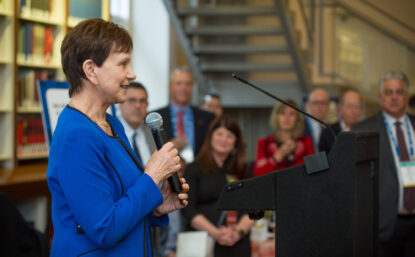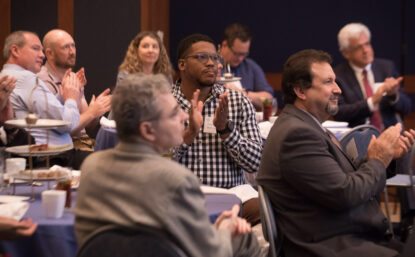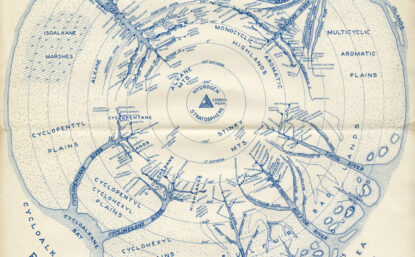Petrochemical Heritage Award
Without petrochemistry, we wouldn’t be missing just gasoline for our cars: we’d be missing such things as nylon, linoleum, and Plexiglas. The Petrochemical Heritage Award was established in 1997 to recognize individuals who made outstanding contributions to this vital field.
The Petrochemical Heritage Award recognizes those whose contributions to public understanding are noteworthy, who have displayed significant entrepreneurship in the petrochemical profession or industry, and who have been active in philanthropic and/or communal affairs. It is presented with the Founders Club each year at the International Petrochemical Conference, held by the American Fuel and Petrochemical Manufacturers.
2026 Honoree: Bhavesh V. (Bob) Patel

Bhavesh V. (Bob) Patel, retired CEO of LyondellBasell Industries, will receive the 2026 Petrochemical Heritage Award on March 28 at the International Petrochemical Conference in San Antonio, Texas.
Patel is widely recognized for his transformational leadership, close transparent relationships with stakeholders, strategic discipline, and commitment to advancing innovation and sustainability across the global chemical and manufacturing industries. As CEO of LyondellBasell from 2015 to 2021, he guided the company through a significant period of expansion, strengthening operations, driving record earnings, and promoting a culture of safety, operational excellence, inclusion, and high performance. He later led W. R. Grace through a company-wide restructuring that positioned the company for sustained earnings growth. As president of Standard Industries, Patel oversaw a portfolio of five industrial businesses generating $12.5 billion in annual revenue and employing more than 20,000 people worldwide.
Patel began his career at Chevron and Chevron Phillips Chemical Company, where he held leadership roles in global operations, strategy, and business development for two decades. A founding member and former vice chair of the Alliance to End Plastic Waste, Patel has championed collaborative industry action to reduce and reuse plastic waste around the world.
Patel holds a bachelor’s degree in chemical engineering from The Ohio State University and an MBA from Temple University. He serves on the boards of Air Products and the Houston branch of the Federal Reserve Bank of Dallas. He has also served as chairman of the American Chemistry Council.
Winners of the Petrochemical Heritage Award
- Lori Ryerkerk (2025)
- Karen McKee (2024)
- Jim Fitterling (2023)
- Aloke Lohia (2022)
- Jim Teague (2021)
- Albert and James Chao (2019)
- Gary K. Adams (2018)
- David Weidman (2017)
- Stephen Pryor (2016)
- James Gallogly (2015)
- Frank Popoff (2014)
- Jim Ratcliffe (2013)
- Marvin Schlanger (2012)
- Raj Gupta (2011)
- Hiromasa Yonekura (2010)
- Mohamed Al-Mady (2009)
- Peter Huntsman and Dave Swalm (2008)
- Dan Duncan (2007)
- J. Virgil Waggoner (2006)
- T. T. Chao (2005)
- William McMinn Jr. (2004)
- Harold A. Sorgenti (2003)
- Herbert E. Doan (2002)
- Jon M. Huntsman (2001)
- Ralph Landau (2000)
- John R. Hall (1999)
- John T. Files (1998)
- Gordon Cain (1997)
About the Sponsors
The Founders Club was founded in 1981 by a group of petrochemical-industry executives who participated in the establishment of the Petrochemical Committee of the NPRA (now AFPM) and ultimately generated the International Petrochemicals Conference (IPC) as a separate identity within NPRA. The Founders Club today is a select group of individuals with a minimum of 25 years of distinguished service in the petrochemical industry. The club proudly advances the legacy inherited from these original “Founders” as contributing stewards of the petrochemical industry with a respect for the past (legacy), activities for the present (networking), and support for the future (recognition).
American Fuel & Petrochemical Manufacturers (AFPM) is a trade association representing high-tech American manufacturers of virtually the entire U.S. supply of gasoline, diesel, jet fuel, other fuels and home heating oil, as well as the petrochemicals used as building blocks for thousands of vital products in daily life.
Featured image: Union Carbide’s First Chemical Operation, Clendenin, West Virginia, undated painting by Roy H. Brown. Science History Institute



